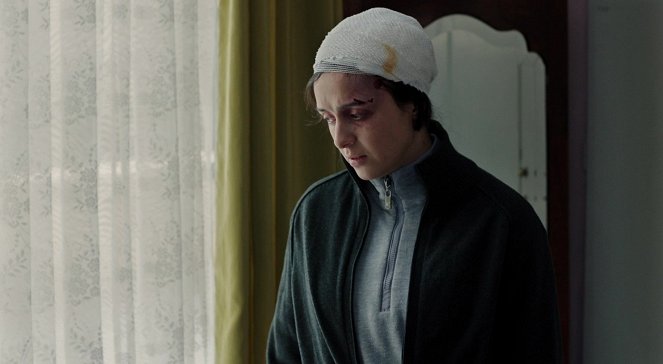Ohjaus:
Asghar FarhadiKäsikirjoitus:
Asghar FarhadiKuvaus:
Hossein JafarianSävellys:
Sattar OrakiNäyttelijät:
Shahab Hosseini, Taraneh Alidoosti, Bábak Karímí, Mina Sadati, Farid Sajjadi Hosseini, Emad Emami, Ehteram Boroumand, Sahra AsadollaheSuoratoistopalvelut (2)
Juonikuvaukset(1)
Iranilais-ranskalaisessa draamaelokuvassa pahaa-aavistamattoman nuorenparin elämä suistuu raiteiltaan heidän muutettuaan asuntoon, jonka entisen asukkaan epäillään harjoittaneen siinä prostituutiota. (Finnkino)
Arvostelut (6)
Though Farhadi manages to avoid theatricality through most of The Salesman without needlessly emphasising the parallels with Miller's Death of a Salesman, the wheels come off in the final act and the film descends into a tired domestic drama dragged down by literalness, stagnation, the effort to exhaustively say everything and the snippy behaviour of the previously level-headed characters. With the exception of the mishandled ending, A Salesman is a powerful, (almost horrifically) tense and multi-layered portrait of a restrictive society in which tradition clashes with modernity, everyone feels vulnerable and guilty (either for what they have done or for what they have not had the courage to do), and they wear masks at all times, not just on stage. Though the film bears some of the hallmarks of a thriller and unfolds in the manner of a detective movie, the revelation of the man’s identity is not the goal of the narrative and as such does not provide any catharsis. For Farhadi, the essential thing is how the individual actors change after the loss of the certainties that they had previously had. As in his previous films, he leaves it up to the viewer to pass judgement. He doesn’t make the situation any easier with new revelations, which generally lead us to sympathise with a different character. He cleverly uses the setting, on which we depend but cannot trust, as a metaphor for the human mind. Especially when judging others, we like to remain loyal to our own ideas of what is right and appropriate, and we are unable to see the given situation through the eyes of others. 70%
()
A Separation may not be repeatable, but this is not a futile variation on the theme of a crumbling relationship affected by a vague catastrophe. It is a pity that Farhadi is far away from the dynamics and spontaneity of the Oscar drama this time, while using a slightly more classic trick (combining theater and reality). Solid standard. [Cannes 2016]
()
Farhadi's first Oscar win helped him understand the recipe for global success with festival audiences. In his subsequent project, he tries to follow the same path but has no luck. A Separation set the bar very high. The Salesman is like a tea bag that you just pulled out of a cup and you don't want to throw it away. So you put it in another cup convinced that it will do its job again, color the water, and give it a tea-like taste. Only this time, the tea will be a little weaker. I won't denigrate The Salesman, it certainly has its merits, but while A Separation worked almost flawlessly from a dramatic standpoint and I wouldn't cut even a minute out of it, with The Salesman I would not hesitate to grab scissors and remove 20 minutes. The storyline could do without intertwining with the theatrical scene, although for me personally, the Iranian adaptation of a typically American play was quite interesting. Equally interesting is to observe that even an internationally acclaimed Oscar-winning director does not dare to break free from the constraints imposed by the official ideology. According to him, Iranian women don't take off their headscarves even at home, and they might even wear them in the shower... In the end, I give the film 4 stars, with the fourth one being frail, just a hair's breadth away from being absent, whereas in the case of Toni Erdmann, it stands out. Toni Erdmann, by the way, deserved much more recognition from the American academics, but that's just how things go in the film world. Overall impression: 70%.
()
As much as Farhadi seemingly articulates his love for theatre through the interweaving of the film's story with the contained play Death of a Salesman, he doesn't disguise the fact that The Salesman is a play itself. It masks this with a cracking opening, but immediately afterwards it moves fluidly into "people talking to each other in a room" mode, with even that setting becoming part of the mood of the scene (see the final, interminably long climax in an empty apartment full of cracks). I'm actually quite surprised that the director has suppressed the ambition to write a rather theatrical play that contains yet another theatrical play. But I understand that as an acclaimed Oscar-winning director, touring the film around festivals is simply a temptation. Incidentally, when I look at the recent enthusiastic reactions of festival juries to films from the Romanian New Wave, the contemporary Dardennes, or even that Farhadi, I am slowly becoming offended by the apparent ageing of the academics who represent them. I want films that tell a story through imagery, experiment formally, provoke and revel in the endless possibilities of post-modernism. Not just strong theses, boringly shot in a way that a deserving octogenarian in his 80s would be able to navigate.
()
Actually, I don't know who I felt more sorry for, the victim of the violence or the perpetrator himself. It was perhaps a bit tired at times, but the pros far outweighed the cons. The main strength of the movie is that the director managed to keep the story more or less opaque until the surprising ending. The acting is also of a high standard, with almost all the actors playing their roles very convincingly. I was also intrigued by the second storyline following the rehearsal and the subsequent performance of the play where, after a traumatic experience, the central couple vent their emotions and feelings, including frustration, anger, fear or anxiety. (80%)
()

